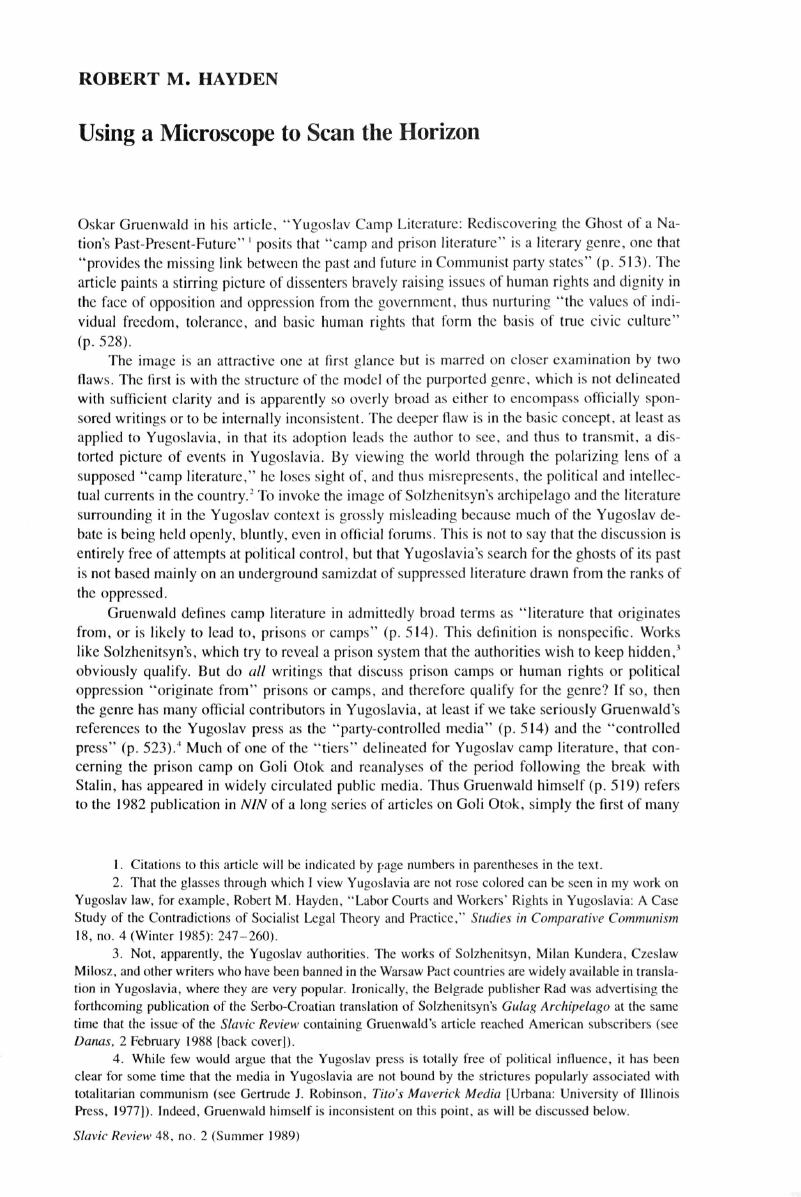Article contents
Using a Microscope to Scan the Horizon
Published online by Cambridge University Press: 19 May 2017
Abstract

- Type
- Ongoing Discussion
- Information
- Copyright
- Copyright © Association for Slavic, East European, and Eurasian Studies. 1989
References
1. Citations to this article will be indicated by page numbers in parentheses in the text.
2. That the glasses through which I view Yugoslavia arc not rose colored can be seen in my work on Yugoslav law, for example, Hayden, Robert M.. “Labor Courts and Workers’ Rights in Yugoslavia: A Case Study of the Contradictions of Socialist Legal Theory and Practice,” Studies in Comparative Communism 18, no. 4 (Winter 1985): 247–260)CrossRefGoogle Scholar.
3. Not, apparently, the Yugoslav authorities. The works of Solzhenitsyn, Milan Kundera, Czeslaw Milosz, and other writers who have been banned in the Warsaw Pact countries are widely available in translation in Yugoslavia, where they arc very popular. Ironically, the Belgrade publisher Rad was advertising the forthcoming publication of the Serbo-Croatian translation of Solzhenitsyn's Gulag Archipelago at the same time that the issue of the Slavic Review containing Gruenwald's article reached American subscribers (see Danas, 2 February 1988 (back cover]).
4. While few would argue that the Yugoslav press is totally free of political influence, it has been clear for some time that the media in Yugoslavia are not bound by the strictures popularly associated with totalitarian communism (see Gertrude J. Robinson, Tito's Maverick Media |Urbana: University of Illinois Press, 1977]). Indeed, Gruenwald himself is inconsistent on this point, as will be discussed below.
5. Thus NIN began another long series on Goli Otok in its issue of 10 January 1988: Miroslav Popovic, “Uspomene ca golog otoka” [Memories from Goli Otok].
6. Otac je na službenom putu |When father was away on business]; this lilm was widely shown within Yugoslavia and internationally, including in the United States.
7. Srećna nova godina, 1949 [Happy New Year, 1949].
8. Of course, few serious analysts of Yugoslav politics would argue that there is a single, unilied, monolithic Party in present-day Yugoslavia, and Gruenwald himself refers to the party in Yugoslavia as “torn by internal dissent and divided along ethnic, republic and regional lines” (p. 527).
9. Indeed, if Gruenwald would argue that discussions in party-controlled media can constitute camp literature, then if we turn the spotlight back on the Soviet Union, Khrushchev and Gorbachev emerge as contributors. One may doubt that Gruenwald intends this result.
10. In this regard it should be noticed that some of the activities that Gruenwald finds objectionable are not practiced only by Communists engaged in a putative civil war against society. Societies with political systems based on directly elected parliamentary democracy exhibit press censorship, for example (see Dhavan, Rajeev, Only the Good News: The Law of Press Censorship in India [Delhi: Manohar, 1987]Google Scholar). The basic individual rights against self-incrimination and unreasonable search and seizure in the United States achieved practical importance only following Supreme Court decisions in the 1960s, which “conservatives” have tried to reverse ever since (see Schwartz, Herman, ed.. The Burger Years: Rights and Wrongs in the Supreme Court, 1969–1986 [New York: Penguin, 1987]Google Scholar). Such individual rights in regard to the power of the police are largely honored in the breach in England ( McBarnett, Dorecn, Conviction: Law, the State and the Construction of Justice [London: Macmillan, 1981]CrossRefGoogle Scholar). Thus an analysis more penetrating than simply associating repression with Communist tyranny would be useful.
11. Ncbojša Popov, “Prilozi proučavanju studentskih pokreta u Jugoslaviji” [Contributions to the investigation of student movements in Yugoslavia], Sociološki Pregled 18, no. 1–2 (1984): 19–42; Nebojša Popov, “Studentski pokreti u Jugoslaviji, 1963–74 (II)” [Student movements in Yugoslavia, 1963–74 (II)], Sociološki Pregled 18, no. 3–4 (1984): 167–195.
12. The play was Jovan Radulović's Golubnjača; though I cannot now confirm the dates involved, the furor over the situation was, and remains, memorable.
13. In regard to Yugoslav “camp literature,” it is curious that Gruenwald has not included in his analysis any of the works by the expatriate (but not émigré) writer Danilo Kiš, whose Grobnica za Borisa Davidoviča, 6th impress. (Belgrade: BIGZ, 1985): translated as A Tomb for Boris Davidovič (New York: Harcourt, Brace, Jovanovich, 1978) is as fine a piece of anti-Stalinist literature as anything produced in Eastern Europe. Perhaps Yugoslav writers can only find their souls if they are so antigovernment that they cannot return, and thus become émigrés?
14. Bailey, Frederick G., The Tactical Uses of Passion (Ithaca, N.Y.: Cornell University Press, 1983 Google Scholar).
- 1
- Cited by


